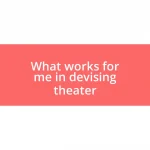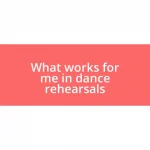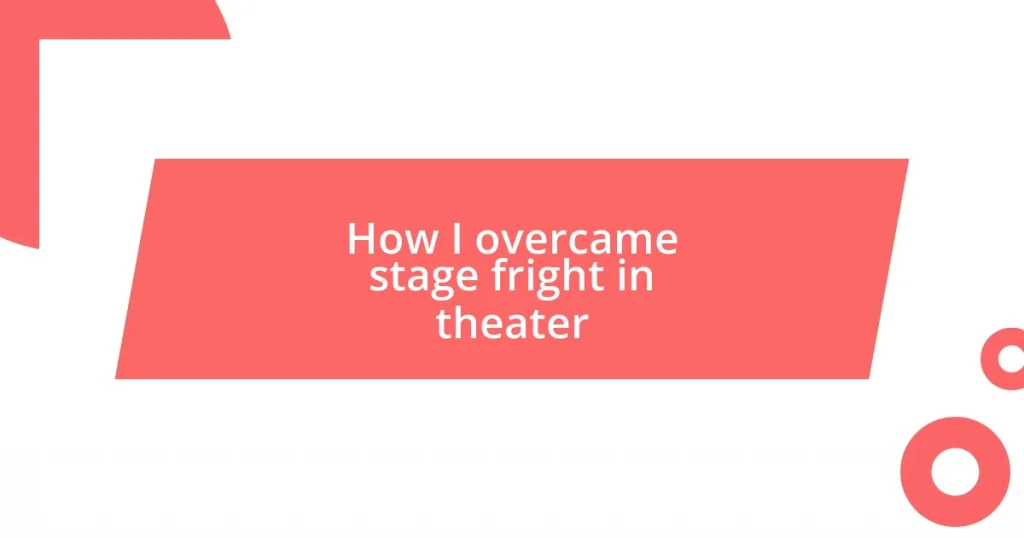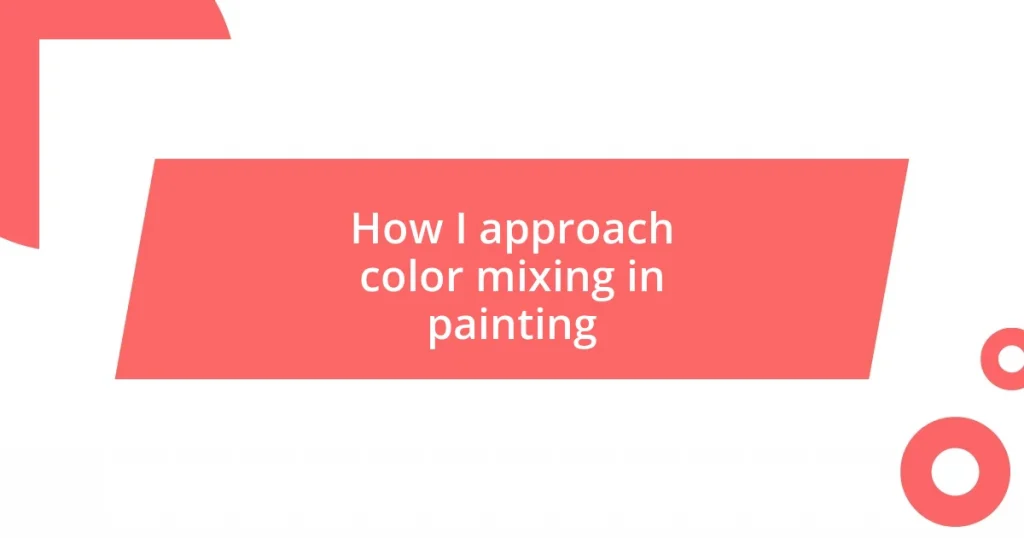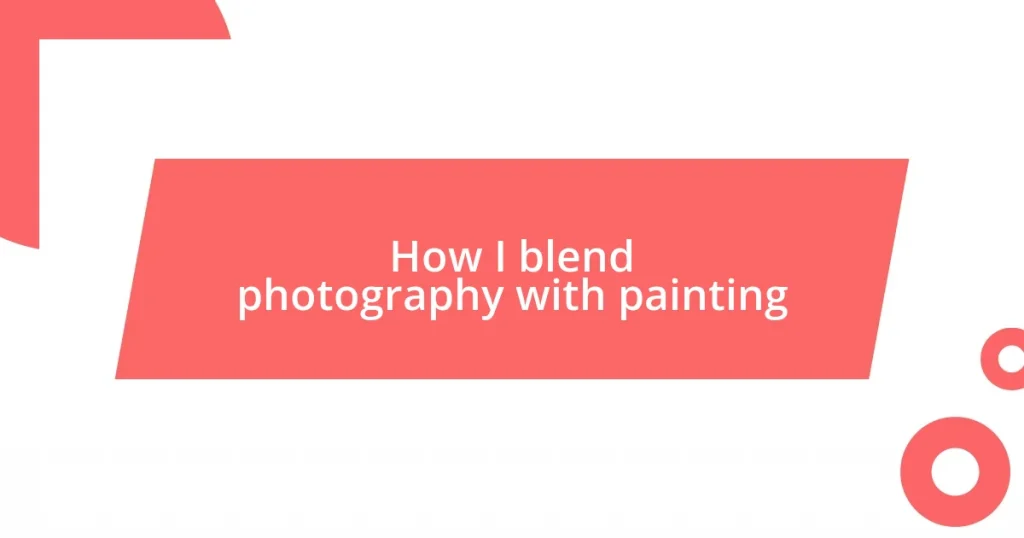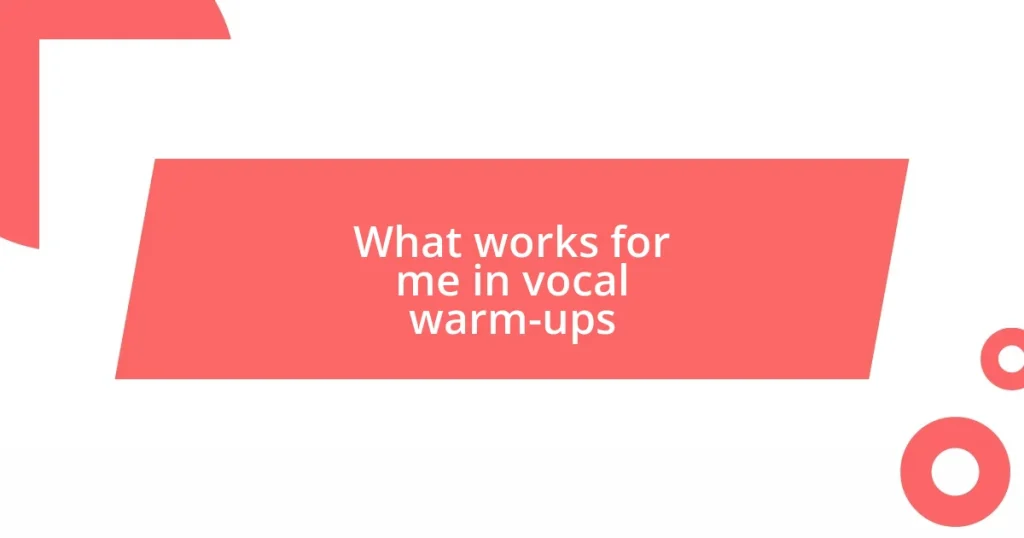Key takeaways:
- Understanding the causes of stage fright, such as fear of judgment and lack of experience, is crucial for performers to manage their anxiety effectively.
- Techniques like visualization, pre-performance routines, affirmations, and mindfulness can significantly alleviate anxiety and boost confidence before going on stage.
- Building a supportive community with peers and reflecting on personal growth can enhance resilience, transforming stage fright into a source of motivation and a shared experience.
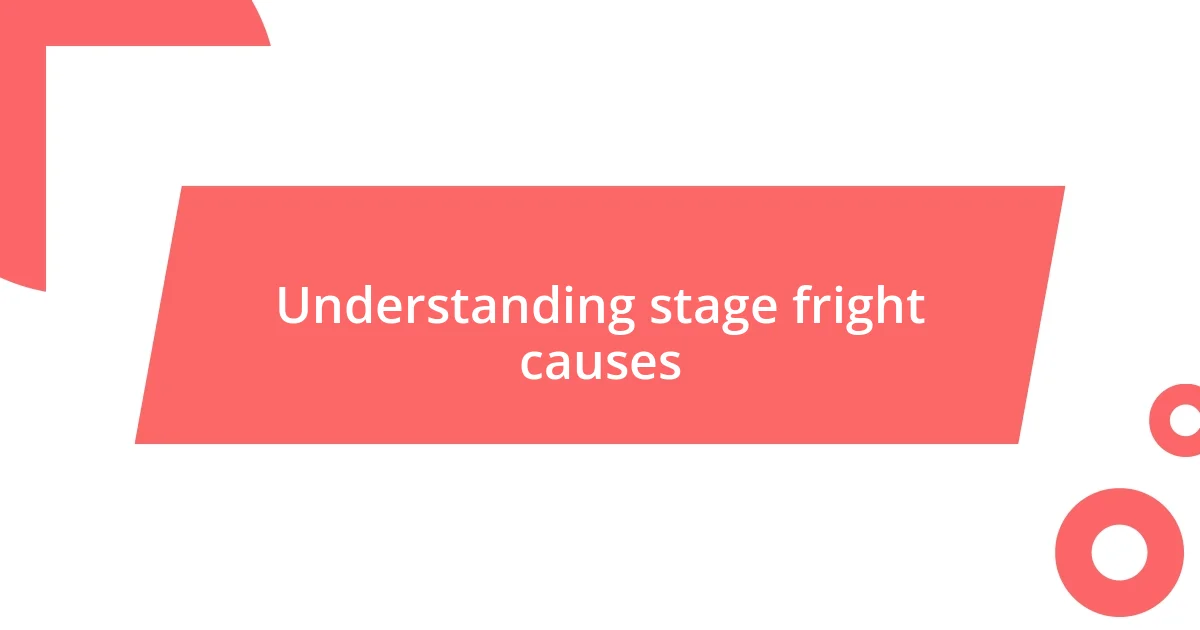
Understanding stage fright causes
Stage fright often stems from a deep-seated fear of judgment or failure. I remember my first performance vividly; my heart raced as I gazed out at the audience. It hit me—what if they didn’t like me? This anxiety is not uncommon; many performers face an internal dialogue that questions their worthiness on stage, which can amplify the fear.
Additionally, the pressure to meet expectations can create an overwhelming feeling of inadequacy. I’ve felt that tight knot in my stomach before stepping into the spotlight, driven by the desire to impress not just the audience, but myself. Is it any wonder that so many of us freeze up when we fear we may not live up to those imagined standards? It’s fascinating how our minds can concoct scenarios that amplify our nervousness in a matter of seconds.
Moreover, a lack of experience can contribute significantly to stage fright. I found that the first time I performed, I was so concerned with forgetting my lines that I barely enjoyed the moment. This made me realize how crucial preparation is—when I’m equipped with knowledge in my craft, the dread lessens. Have you ever noticed how practice transforms those anxious thoughts into confident performance? The more we expose ourselves to the stage, the more comfortable we can become in facing those invisible fears.
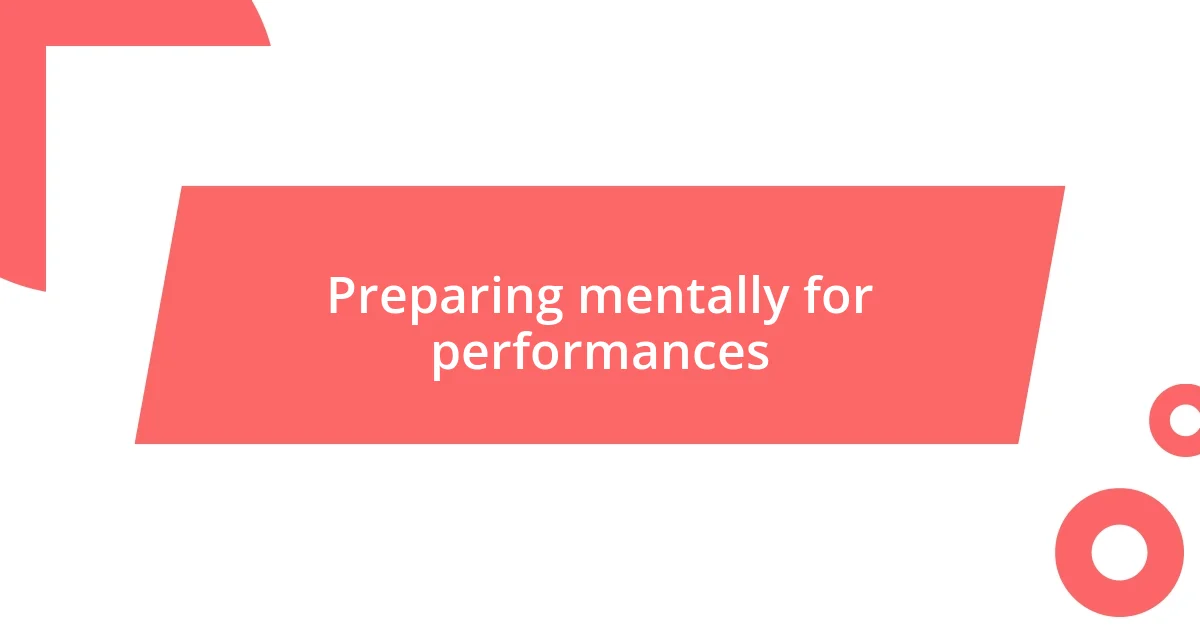
Preparing mentally for performances
Preparing mentally for performances is a vital aspect of overcoming stage fright. One technique that has worked wonders for me is visualization. Before I step on stage, I close my eyes and imagine the audience reacting positively to my performance. Picture this: the applause, the smiles, and the feeling of accomplishment. This simple mental imagery can create a powerful sense of reassurance that helps calm my nerves.
I also find it helpful to cultivate a pre-performance routine. Whether it’s a few deep breaths, stretching, or listening to my favorite music, establishing a ritual can center my mind. I remember one performance where I channeled my nerves into excitement by dancing backstage, and suddenly, the anxiety melted away. Routines allow me to shift my focus from fear to self-assuredness, which is essential for a successful show.
Lastly, I strive to replace negative self-talk with affirmations. When those pesky thoughts creep in, I remind myself of past successes. I often say to myself, “You’ve done this before; you can do it again.” It’s amazing how changing that internal narrative can empower me. By preparing mentally through visualization, routines, and affirmations, I’ve transitioned from a timid performer to one who embraces the stage with confidence.
| Technique | Description |
|---|---|
| Visualization | Imagining positive outcomes to create comfort and reassurance. |
| Pre-Performance Routine | Establishing rituals that help channel nerves into positive energy. |
| Affirmations | Replacing negative self-talk with empowering phrases that boost confidence. |
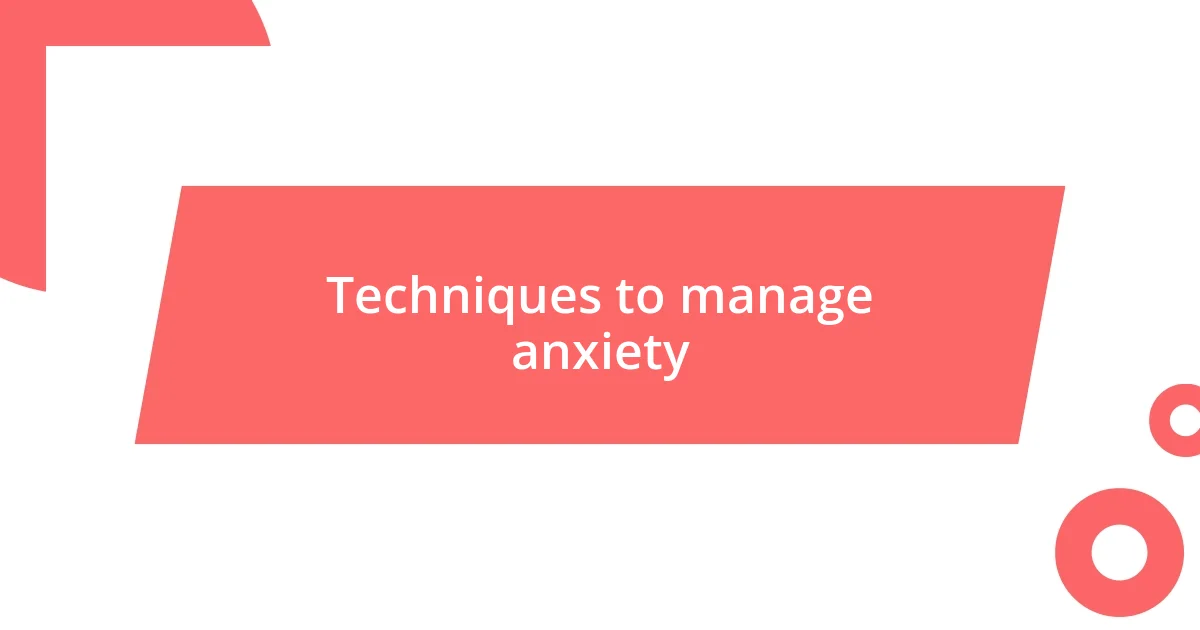
Techniques to manage anxiety
Managing anxiety before stepping on stage is an essential skill for any performer. I’ve discovered that mindfulness techniques can work wonders. Just the other day, before an important performance, I took a few minutes to focus on my breathing. I inhaled deeply for a count of four, held it, and then exhaled slowly. It felt as if the air had whisked away some of my worry, creating a calm space mentally. By grounding myself in the present, I allowed my mind to let go of anxieties about the future and focus on what truly mattered: my performance.
You might also consider employing grounding techniques that help divert your attention from anxious thoughts. Here are some that I’ve personally found effective:
- Grounding Exercises: Engage your senses by identifying three things you can see, hear, and touch around you to reconnect with your surroundings.
- Progressive Muscle Relaxation: Tense and then relax different muscle groups, starting from your toes and working up to your head, to release physical tension.
- Positive Anchoring: Think about a comforting memory or inspiring quote that can serve as your “go-to” mental anchor whenever anxiety spikes. My favorite is a quote that reminds me why I love performing in the first place.
Incorporating these techniques into my routine has transformed the way I approach each performance. By focusing on these manageable steps, anxiety becomes a mere whisper instead of an overwhelming roar.
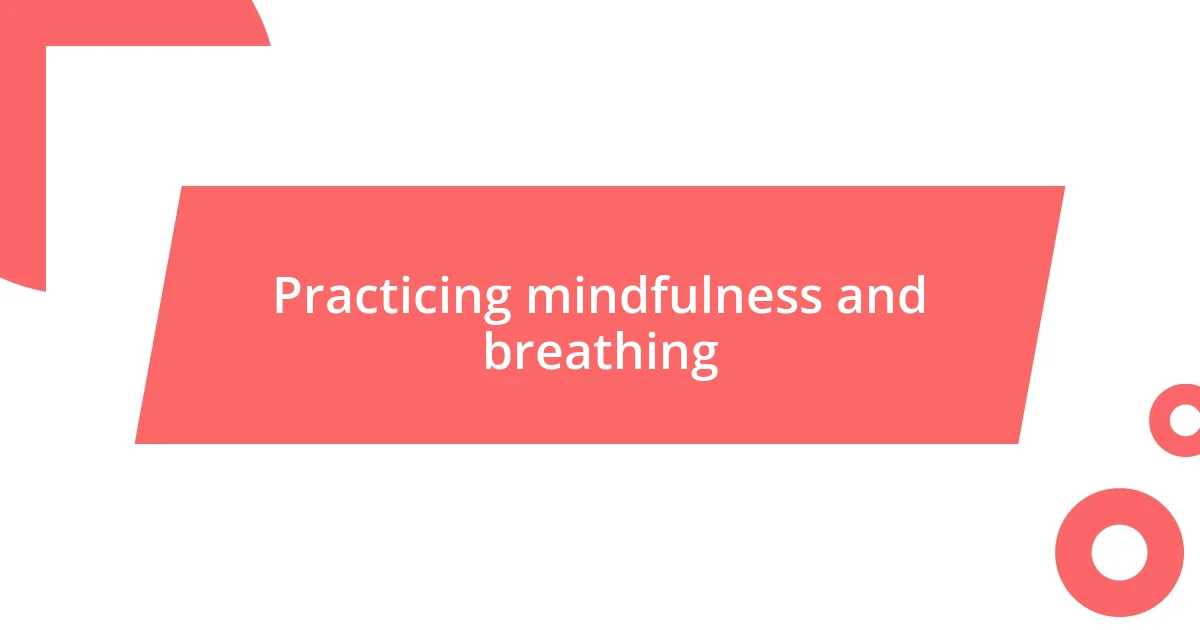
Practicing mindfulness and breathing
Practicing mindfulness and breathing is like having a secret weapon in my performance toolkit. There was a time when I felt overwhelmed before stepping on stage; deep breathing became my lifeline. I vividly remember one night feeling the suffocating grip of anxiety. So, I closed my eyes, took a deep breath in for four counts, held it for two, and then released it slowly. It was as if I was deflating that anxious balloon inside me, allowing calm to seep in.
I’ve discovered that mindful breathing is not just a routine; it genuinely shifts my perspective. Sometimes, when I’m backstage, I visualize each breath as a wave washing over me, pulling away stress and negativity. Have you ever tried that? It’s fascinating how such a simple act can elevate your state of mind. Whenever I focus solely on my breathing, I find clarity. In those moments, I remind myself that this is where I want to be: in the spotlight, sharing my passion.
Integrating mindfulness into my pre-performance ritual has sparked noticeable changes in my confidence. Just last week, during a particularly challenging rehearsal, inhaling deeply and grounding myself helped me push through my insecurities. Instead of being overwhelmed by the fear of the audience, I felt connected to my craft. It’s amazing how the act of being present and mindful can transform not only the way I perform but also how I experience the moments before I even step on stage.
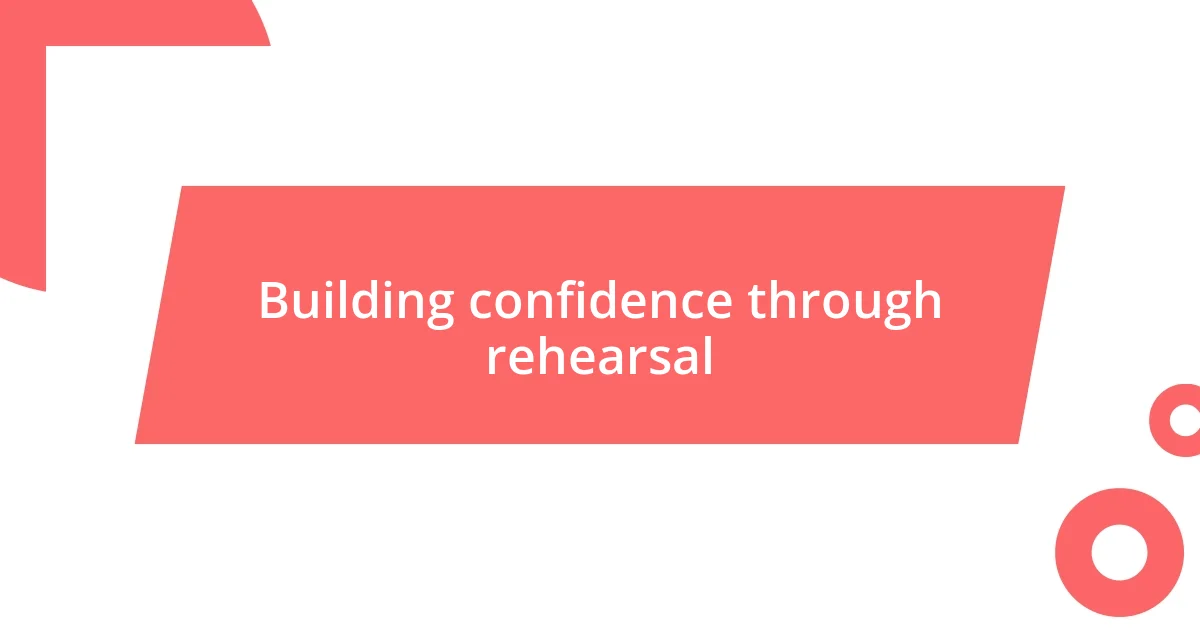
Building confidence through rehearsal
Rehearsals became my sanctuary. I recall one particular session where I felt utterly unsure about my lines. As we ran through the scene for the umpteenth time, something shifted. Each repetition was like chiseling away at a block of stone, revealing the confident performer hidden inside. It was exhilarating to feel those worries slowly fade with every run, transforming anxiety into familiarity.
I’ve found that practicing in a space with my fellow actors creates a bond that’s almost unshakeable. There’s a collective energy that builds, bolstering my confidence. I remember sharing a laugh over a flubbed line with my castmates, realizing that everyone experiences those moments of doubt. It’s almost like a rite of passage; when we can all embrace our imperfections together, the stage feels a little less intimidating. Have you experienced that sense of camaraderie? It’s incredible how sharing those rehearsals can transform a daunting task into a shared journey.
The magic of rehearsal goes beyond just memorizing lines; it’s about getting comfortable with the unpredictable nature of live performance. I’ll never forget a rehearsal where the lights went out unexpectedly. Instead of panicking, we adapted and played through it. That experience taught me resilience. Each time I step onto the stage now, I carry that lesson with me, knowing I have the skills to overcome challenges, which boosts my confidence exponentially.
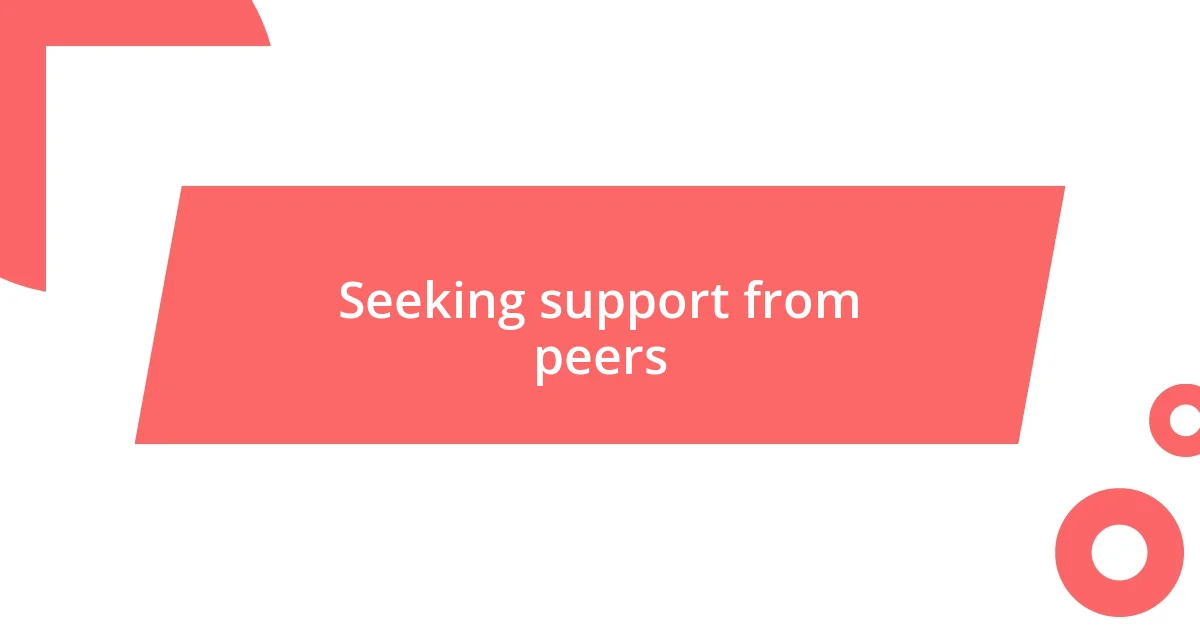
Seeking support from peers
Reaching out to my peers was a game changer for me. I remember sitting down with a couple of fellow actors before a big performance, sharing our fears and insecurities. It felt like pulling back a heavy curtain; suddenly, I wasn’t alone in my stage fright. Those candid conversations allowed me to realize that everyone harbored similar anxieties, and voicing them made them feel less dismal. Have you ever noticed how sharing your worries with someone revokes some of their power?
When I first began to confide in my castmates, I found a remarkable sense of support that I didn’t anticipate. One afternoon, a friend shared her own experience of freezing on stage; her vulnerability opened the door to a deeper connection between us. I can still recall the warmth of her encouragement as she reminded me that those moments of uncertainty didn’t define our worth as performers. It was that moment of solidarity that built a safety net of understanding, making the stage feel like a communal space rather than an isolating one.
There were nights when I received a simple pat on the back or a wink of encouragement right before walking onstage, and those gestures meant the world to me. I began to understand the importance of uplifting one another, creating an atmosphere where we could thrive together. Looking back, I can’t help but smile when I think of those shared moments of laughter and support. It taught me that, in the theater world, vulnerability can be a powerful unifier, and that connection is key to overcoming stage fright.
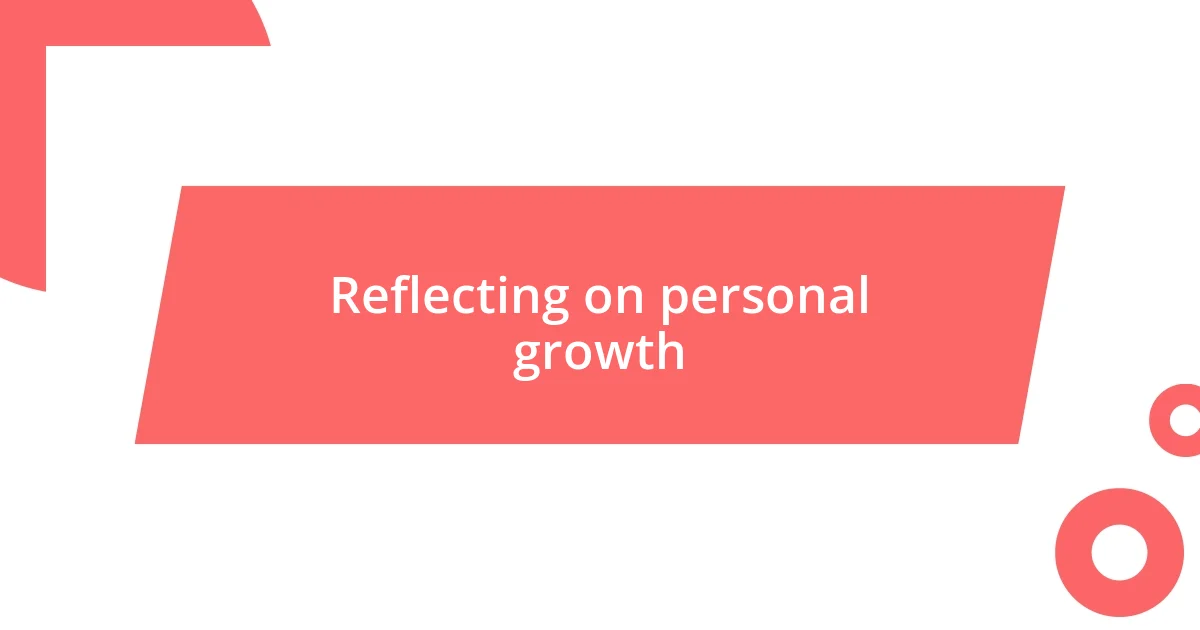
Reflecting on personal growth
Reflecting on my personal growth, I often think about how each performance taught me more than just lines. I’ll never forget the first time I stepped onto that stage, gripped by a whirlwind of fear and excitement. But with every performance, I felt a transformation happen; it was as though I was shedding layers of self-doubt, revealing a more confident version of myself. Does that resonate with anyone who’s struggled with nerves on stage?
I recall one particular show where I completely lost my place in the monologue. Instead of freezing, I took a deep breath and improvised. That unexpected moment became a turning point for me. Not only did I learn to embrace spontaneity, but I also discovered that mistakes don’t have to be catastrophic; they can, in fact, break the ice. Has anyone else found that going off-script sometimes leads to the most memorable moments?
Looking back, I realize that my journey through stage fright was less about conquering fear and more about discovering resilience. Each challenge I faced was an opportunity to grow. I remember feeling a rush of pride after performing in front of a full audience, knowing I had come so far. That moment of realization—seeing how fear had transformed into a source of motivation—was exhilarating. It’s funny how our greatest struggles can lead to our most remarkable triumphs, isn’t it?






